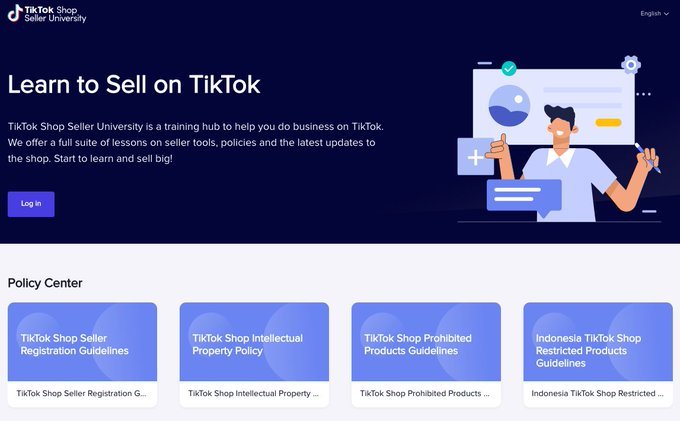SOCIAL
TikTok Launches New Seller University as it Looks to Expand its eCommerce Push

As expected, TikTok is working quickly to provide more monetization options for creators, with new eCommerce and in-stream selling tools that users will eventually be able to incorporate into their profiles, videos and live-streams.
The latest development on this front, following its partnership with Shopify and its recent showcase of coming eCommerce options to advertisers, is a new education portal called TikTok Shop: Seller University, which TikTok is currently testing in Indonesia.

As you can see here, TikTok describes the new education platform as:
“…a training hub to help you do business on TikTok. We offer a full suite of lessons on seller tools, policies and the latest updates to the shop. Start to learn and sell big!”
Users will eventually be able to sign-up to the program to sell products on TikTok in a range of ways.
“If you choose to sell through your personal page, you can then display products via livestreaming or short videos, with product anchors embedded in your content. When customers view your content, they can be re-directed to the corresponding product detail page by clicking on the product anchor.”

TikTok also notes that those who sign up to the program will be able to showcase their products on a second tab of their profile page.
In addition to this, the program also has an affiliate element, which will enable brands to sign-up to have prominent TikTok creators promote their offerings on the platform.
“If you choose to sell through Affiliate, you can upload your products to the Seller Center, set your promotion plans, and collaborate with TikTok influencers to promote your products.”
That also ties into TikTok’s Creator Marketplace, which provides a listing of platform influencers that brands can partner with for promotions.
eCommerce is a key avenue for TikTok’s next evolution, with the platform working to build an eco-system that ensures its creators can make money from their on-platform efforts. If they can’t, they’ll soon realize that they can generate more income by posting their content to Instagram or YouTube instead – and if TikTok loses those top creators, it could quickly lose relevance, and audience, to the larger players.
TikTok’s parent company ByteDance has already leaned into eCommerce with the Chinese version of TikTok, called ‘Douyin’, which now generates the majority of its revenue from in-stream shopping.

Given this, it’s little surprise to see TikTok accelerating its push into eCommerce as it eyes the next stage of growth. The platform is reportedly closing in on a billion users, and is at a key stage of development. If it can successfully implement revenue-generation tools for creators, it stands a good chance of becoming a major challenger for social media ad dollars long-term, establishing a sustainable foundation for future growth.
That, of course, does also depend on regulatory moves and possible restrictions, with some questions still swirling over the app’s future in the US. The Biden Administration has indicated that it will not pursue the previous government’s push to have TikTok sold off to an Oracle/Walmart-led consortium, but it has also noted that it may look to have the platform wholly sold into US ownership at some stage.
TikTok may still have to contend with those concerns, but in terms of its business structure, it also needs to implement eCommerce tools, and fast, to maximize its potential.
This new platform looks like another key step.
In order to sell products on TikTok, you first need to sign up for a TikTok account.
“Once you’ve signed up to TikTok, you can then join the TikTok Shop through the Seller Center. Please follow the instructions below:
- First, sign up as a TikTok Shop seller and enter your basic information such as where you are based, your phone number, email address, and more. Please note that all fields must be completed.
- Next, enter your basic business information such as shop name, where your shop is based, warehouse address, and more.
- Complete or provide the required documents (such as your business registration information or personal information). The TikTok Shop reserves the right to verify the information that has been submitted.”
You can’t sign up for the Seller Center as yet, but it looks to be coming very soon.
Thanks to Matt Navarra for the heads up about the new Seller University.
